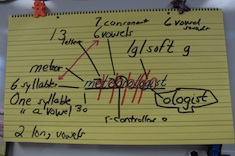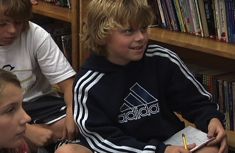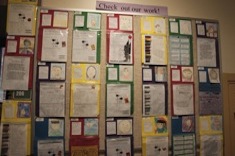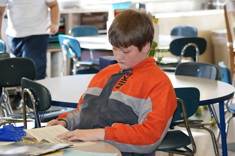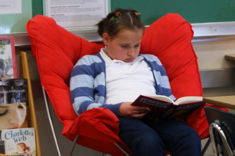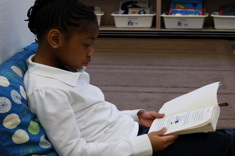Maria Caplin
Maria Caplin is a 5th grade teacher at Bailey Elementary in Dublin, Ohio.
All Content
Building Stronger Wordsmiths
Maria Caplin is integrating vocabulary work into content areas.
May’s Menu
Maria Caplin gives her students a range of options for closing out a year of literacy learning in style.
Read Alouds and Standards
Maria Caplin explains how read alouds do double duty in her fifth-grade classroom, as they help build a love for story and help students master key literacy and content area standards.
Digital Literacy Workshop
Maria Caplin has suggestions for making transitions to digital literacy in reading and writing workshops.
Rethinking Reading Goals
Maria Caplin develops a system for helping students move beyond simple goals like noting the number of pages read.
Digital Status of the Class
Maria Caplin explains how a digital status sheet saves minutes every week that add up to extra hours of instructional time over the year.
Going Public with Word Work
Maria Caplin is discouraged at the low level of transfer of new vocabulary in her fifth graders’ writing, so she makes some changes in her classroom.
Reading Math: Starting with Visuals
Maria Caplin finds launching her math minilessons with an image helps her students read math problems in deeper ways and notice mathematical components of everyday life.
Getting to Know You: Brown Bag Objects
Maria Caplin uses a getting-to-know-you activity in the first days of school to jumpstart research reading and writing with her fifth-grade students.
Remembering to Slow Down at the End of the School Year
Maria Caplin shares her strategies for slowing down at the end of the year with her fifth graders and reflecting on the growth and learning that can't easily be measured with tests.
Common Core Research Shifts
Maria Caplin explains four changes she is making in her fifth-grade classroom with writing instruction because of the Common Core.
Limiting and Extending Choice in Student Research Projects
When students are able to pick any research topic, they often will choose something they have already studied extensively. How can teachers allow students to pick topics for research they care passionately about and at the same time ensure there is the potential for rich inquiry? Maria Caplin describes the process she uses in her fifth-grade classroom to help students find and refine research topics for deeper learning.
Cooking Up Interest in Words with Fifth Graders
Maria Caplin continues her series on sparking vocabulary learning, this time highlighting fun activities.
Supporting the Transition to Middle School: An Elementary Teacher’s Perspective
Maria Caplin shares how and why she began to collaborate with Gretchen Taylor, a sixth-grade teacher who would soon be the middle school teacher for some of her students.
Weaving Word Study into Writing Workshop in 5th Grade
Maria Caplin describes how she integrates word study with intermediate students in writing workshops.
It’s Not About the Tool — It’s About the Learning
Maria Caplin explains step by step how she integrated the use of iPods into her writing workshop, helping students use them to record notes and create persuasive texts.
Shifting from Spelling to Word Study in 5th Grade
Maria Caplin explains how she made the shift from spelling to word study in the intermediate grades.
Newbery Club Wrap-Up
Even though their Newbery Club of 5th graders didn't read the winning book in advance, Maria Caplin and Bill Prosser consider the club a success. They close out their series on the club with thoughts on how they will do things differently next fall.
Starting a Newbery Club with Students
If you want to re-energize teen and tween readers in your school, start a Newbery Club. These voluntary groups read, discuss, and take their best guess of which book will win the coveted award in mid-January.
Launching the Newbery Club
Bill Prosser and Maria Caplin continue their series on a Newbery Club for 5gth graders in their school. In this installment, they write about the launch of the club.

